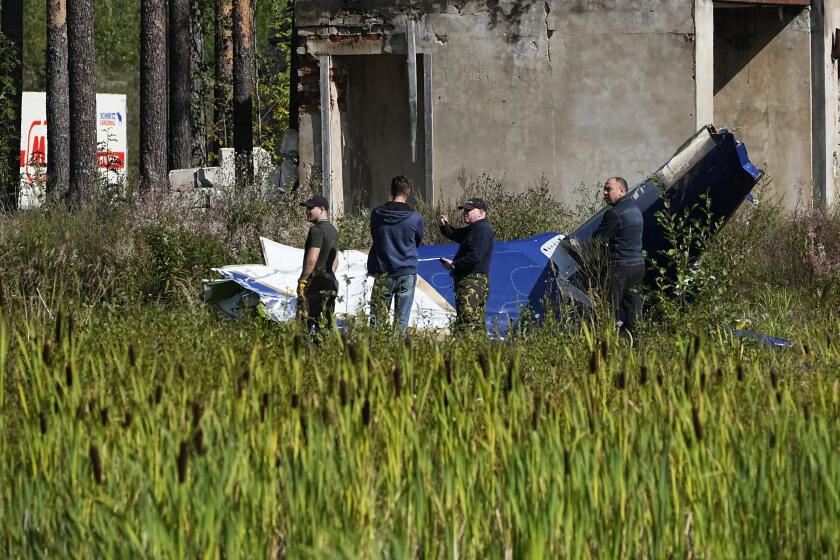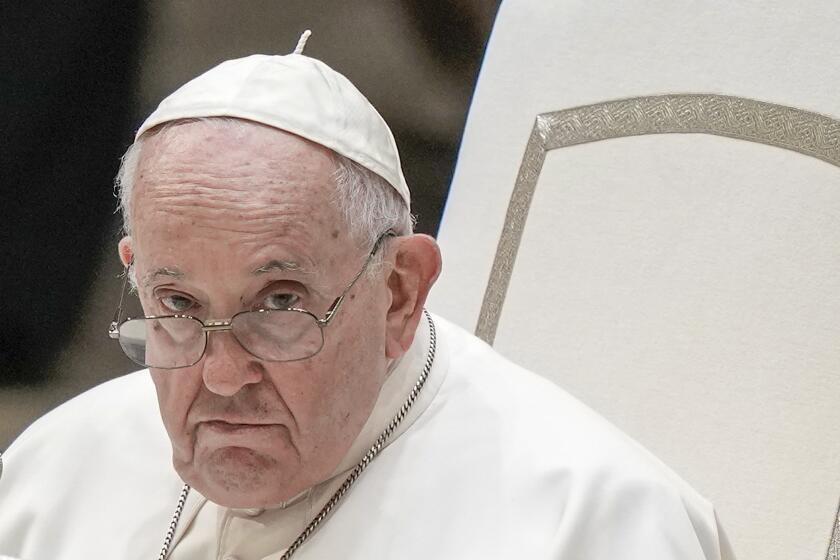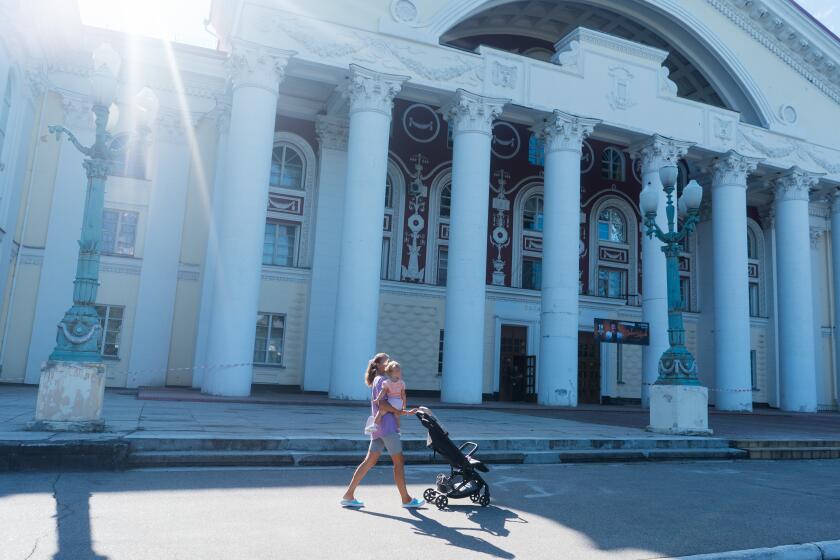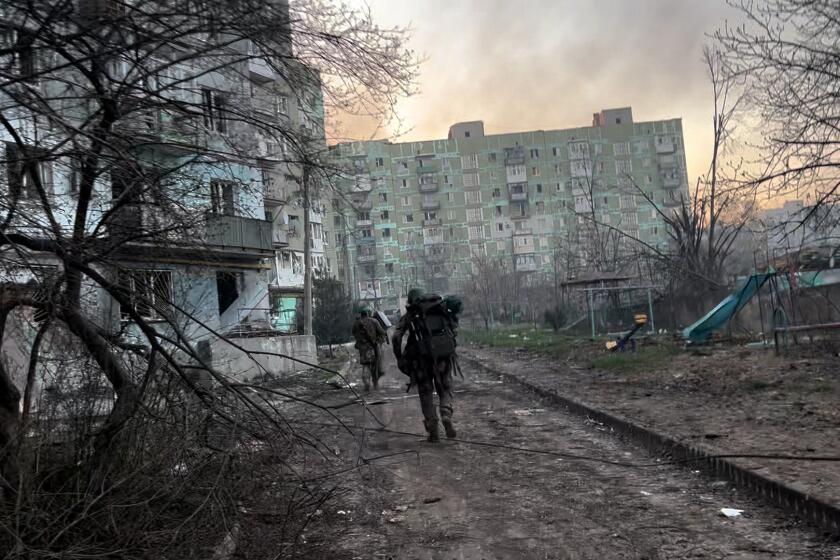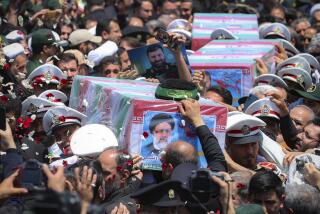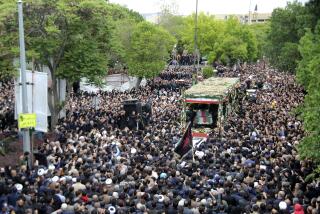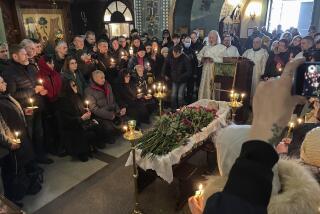Russian mercenary boss Yevgeny Prigozhin is buried in private event, ending his tumultuous journey
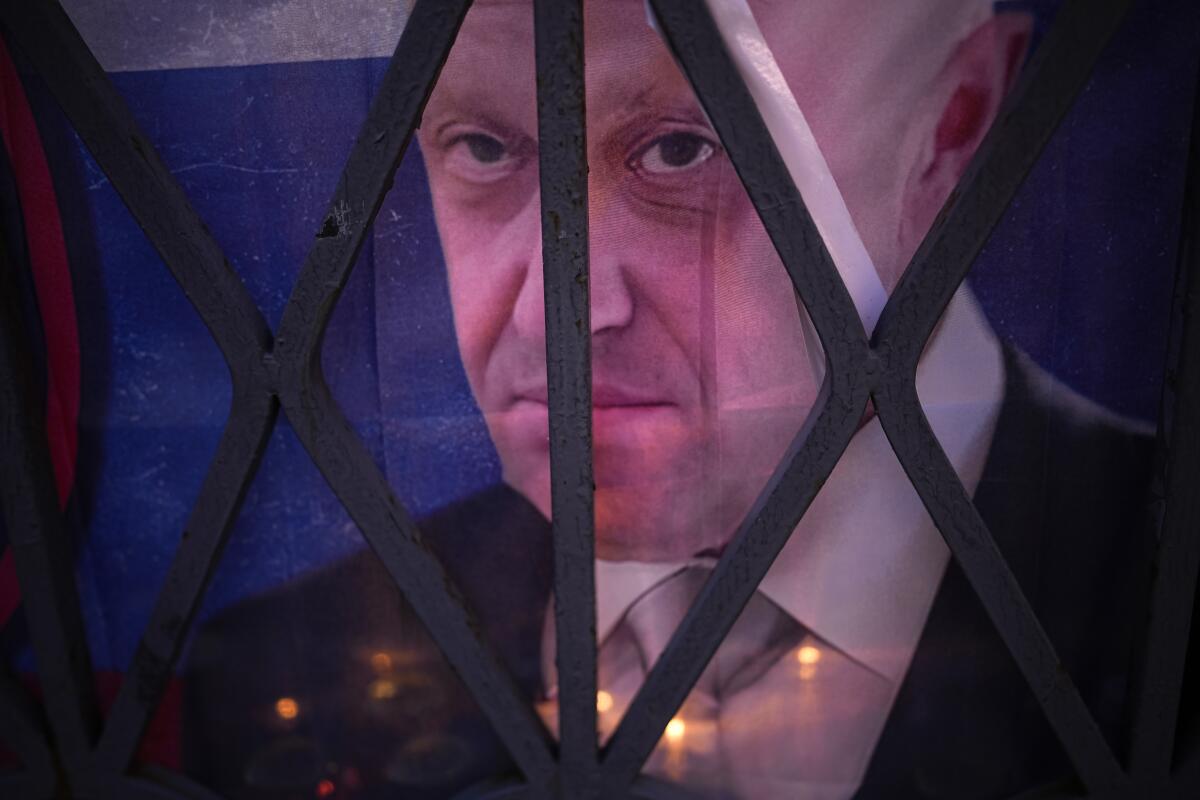
- Share via
ST. PETERSBURG, Russia — A private burial was held for Yevgeny Prigozhin, ending a tumultuous journey from St. Petersburg street thug to Kremlin-financed mercenary leader, following a suspicious plane crash two months after his brief mutiny that challenged the authority of President Vladimir Putin.
His spokespeople said Tuesday a service took place behind closed doors, and directed “those who wish to bid their farewell” to the 62-year-old head of the Wagner private military contractor to go to the Porokhovskoye cemetery in St. Petersburg, his hometown. Their statement ended media speculation on where and when Prigozhin would be laid to rest, with his funeral shrouded in secrecy.
A wooden cross towered over his flower-covered grave. Nearby stood a Russian tricolor and a black Wagner flag. Russian media cited unidentified sources as saying Prigozhin was laid to rest Tuesday without any publicity, per his family’s wishes.
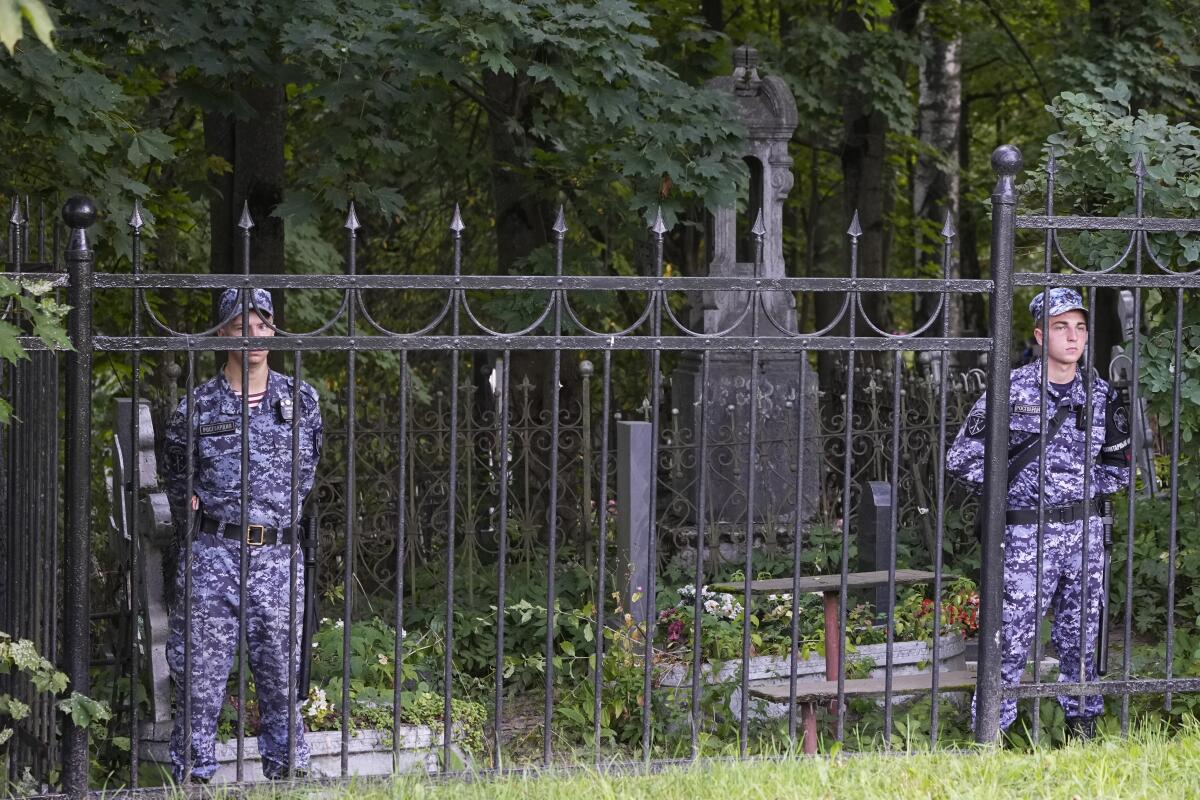
Members of the Russian National Guard, known as Rosguardia, were stationed along the fence at the cemetery, steering visitors away after it closed for the day.
Putin’s spokesman said the president would not attend the service. The Russian leader had decried the armed rebellion in June as “treason” and “a stab in the back.”
Putin finally speaks about Russian mercenary Wagner chief Yevgeny Prigozhin, who is presumed to have died in a plane crash after staging a failed coup.
Russian state television, which for decades has served as the main source of information for the vast majority of Russians, barely covered the funeral.
One major channel, Russia 1, dedicated less than one minute of airtime to it in its evening news bulletin, only to say that the funeral ceremony took place “without outsiders and the press at the request of the family” and that Prigozhin’s grave is next to that of his father, who died in 1978. Another popular station, Channel One, ignored it completely in their evening news.
As questions swirl over how Wagner boss Yevgeny Prigozhin’s plane crashed, many note that other Kremlin foes have met suspicious and violent ends.
The secrecy and confusion surrounding the funeral of Prigozhin and his top lieutenants reflected a dilemma faced by the Kremlin amid swirling speculation that the crash was likely a vendetta for his June 23-24 uprising.
While it tried to avoid any pomp-filled ceremony for the man branded by Putin as a traitor for his rebellion, the Kremlin couldn’t afford to denigrate Prigozhin, who was given Russia’s highest award for leading Wagner forces in Ukraine and was idolized by many of the country’s hawks.
Putin’s comments on Prigozhin’s death reflected that careful stand. He noted last week that Wagner leaders had “made a significant contribution” to the fighting in Ukraine and described Prigozhin as a ”talented businessman” and “a man of difficult fate” who had “made serious mistakes in life.”
Sergei Markov, a pro-Kremlin political analyst, noted that Prigozhin had become a legendary figure to his supporters, who are increasingly critical of the authorities.
The Vatican says Pope Francis’ praise of Russia’s imperial past was not intended to give any backing to Moscow’s modern-day aggression in Ukraine.
“Prigozhin’s funeral raises an issue of communication between the bureaucratic Russian government system that doesn’t have much political potential and [the] politically active patriotic segment of the Russian public,” Markov said.
The secretive service “became the final stage of a special operation to eliminate him,” said Tatiana Stanovaya, a senior fellow at the Carnegie Russia Eurasia Center.
“Everything was as closed as possible, under full control of the security forces, with distracting maneuvers,” she said in a commentary on her Telegram channel.
The country’s top criminal investigation agency, the Investigative Committee, officially confirmed Prigozhin’s death Sunday.
The committee didn’t say what might have caused Prigozhin’s business jet to plummet from the sky minutes after taking off from Moscow en route to St. Petersburg. Just before the crash, Prigozhin had returned from a trip to Africa, where he sought to expand Wagner’s activities.
Also Tuesday, a funeral was held at St. Petersburg’s Northern Cemetery for Wagner’s logistics chief, Valery Chekalov, who was among the 10 people killed in the plane crash.
A Ukrainian city grapples over whether to rename its history museum, currently named after a great-uncle of warlord Yevgeny Prigozhin
Prigozhin’s second-in-command, Dmitry Utkin, a retired military intelligence officer who gave the Wagner Group its name based on his own nom de guerre, was also killed.
A preliminary U.S. intelligence assessment concluded that an intentional explosion caused the plane to go down, and Western officials have noted a long list of Putin’s foes who have been assassinated. The Kremlin rejected Western allegations that the Russian president was behind the crash as an “absolute lie.”
Prigozhin, an ex-convict who earned millions and his nickname “Putin’s chef” from lucrative government catering contracts, served Kremlin political interests and helped expand Russia’s clout by sending his mercenaries to Syria, Libya, the Central African Republic and other countries. Wagner, one of the most capable elements of Moscow’s forces, played a key role in Ukraine, where it captured the Ukrainian eastern stronghold of Bakhmut in late May.
If war is hell, there’s a credible case Bakhmut is its ninth circle, as Russia besieges the Ukrainian city that has symbolic, if not strategic, value for both sides.
The plane crash came two months after Prigozhin launched a rebellion against the Russian military leadership. The brutal and profane leader ordered his mercenaries to take over the military headquarters in the southern city of Rostov-on-Don and then began a march on Moscow. They downed several military aircraft, killing more than a dozen pilots.
Putin denounced the revolt as “treason” and vowed to punish its perpetrators, but hours later struck a deal that saw Prigozhin ending the mutiny in exchange for amnesty and permission for him and his troops to move to Belarus.
Start your day right
Sign up for Essential California for the L.A. Times biggest news, features and recommendations in your inbox six days a week.
You may occasionally receive promotional content from the Los Angeles Times.
The fate of Wagner is uncertain. Putin said Wagner fighters could sign a contract with the Russian military, move to Belarus or retire from service. Several thousand have deployed to Belarus, where they are in a camp southeast of the capital, Minsk.
More to Read
Sign up for Essential California
The most important California stories and recommendations in your inbox every morning.
You may occasionally receive promotional content from the Los Angeles Times.
